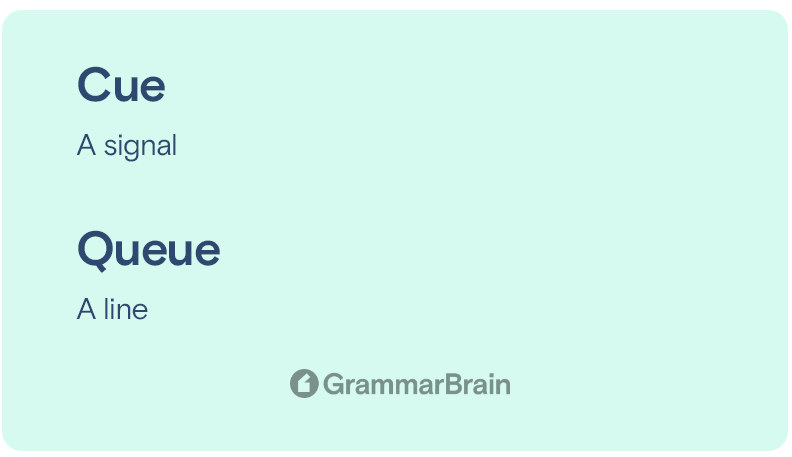What is the difference between a queue and a cue? These two words are homophones, as they sound different (although spelled differently) and have very different meanings. Learn what the difference is between these two words in this short American English guide.
Difference between queue vs cue
A queue is a line and a cue is a signal.
What is Cue?
As a noun, a “cue” is a stimulus that provides information about what to do. It is also known as a discriminative stimulus. In an instance, a “cue” is an actor’s line that serves as a signal for some following action or speech. Also, a “cue” resembles a pool cue, cue stick, or pool stick in a game of billiards
As a verb, cue means assisting by acting, reciting, or suggesting the next words of something forgotten or imperfectly learned. It is a prompt or a reminder. Alternatively, the cue is a frequently used term in billiards, pool to take aim at the cue ball and hit it with the cue.

What is a Queue?
A queue is a line, and a cue is a signal. The queue is derived from the Latin word “tail.” It means a line or placing a line arranged within a row (infinite). Both cue and queue have similar pronunciations, but the meanings are different.
Examples of queues are The stack of trays in a cafeteria, people standing at the ticket counter, a driveway at the McDonald’s cafe, an escalator, and A car wash. In computer science, a queue is an ordered list that enables in and out operations, i.e., inserts and deletes.
It works on the common principle of FIFO – First in, first out or LIFO – Last in First Out. When no more insertion is possible, it becomes a stack overflow situation. In that case, a buffer must be created, or some deletions must be done to make way for new insertions.
| Word | Definition |
| Cue (American English) | a thing said or done that serves as a signal to an actor or other performer to enter or to begin their speech or performance. |
| Queue (British English) | a thing said or done that serves as a signal to an actor or other performer to enter or to begin their speech or performance. |
Can queue be used as a verb?
Yes, when an action takes place like standing in a queue, arranging in a queue, or queuing, then it refers to doing something in a specific order. Queuing for tickets outside the mall or files queued by the operating system are perfect examples.
Usage of Queue
- We joined the queue to collect the admission form.
- I wanted to eat in that restaurant, but there was a long queue outside.
- The data for adequately arranged in queues.
Where is a queue applicable?
- The queue principle is applied in the case of MP3 players and portable CD players to add a song at the end or to play from the front.
- These manage requests on a single shared resource like CPU scheduling and disk scheduling.
- These handle hardware or real-time systems interrupts.
- These handle website traffic.
- In routers and switches in computer networking.
Which types of queues exist?
There are 4 types – Simple queue, circular queue, priority queue, and double-ended queue.
Alternatively, the person at the end of the “queue” gives you a cue/hint to move a step forward as he leaves.
- Cue = a hint or a signal, or a prompt
- Queue = a line or a sequence
Where is the cue applicable?
The couple gave a cue to the waiter to serve more wine.
I mentioned my friend, and right on cue, he walked in.
As a verb, cue means giving a signal. It can also turn out to be “cued.”
For example: (1) Cue me when it is my turn.
- (2) The traffic inspector cued the truck driver to pull forward.
- (3) The IT director cued the actors to resume.
- (4) He cued me to move to proceed with the documentation.
Inside this article
Fact checked:
Content is rigorously reviewed by a team of qualified and experienced fact checkers. Fact checkers review articles for factual accuracy, relevance, and timeliness. Learn more.
Core lessons
Glossary
- Abstract Noun
- Accusative Case
- Anecdote
- Antonym
- Active Sentence
- Adverb
- Adjective
- Allegory
- Alliteration
- Adjective Clause
- Adjective Phrase
- Ampersand
- Anastrophe
- Adverbial Clause
- Appositive Phrase
- Clause
- Compound Adjective
- Complex Sentence
- Compound Words
- Compound Predicate
- Common Noun
- Comparative Adjective
- Comparative and Superlative
- Compound Noun
- Compound Subject
- Compound Sentence
- Copular Verb
- Collective Noun
- Colloquialism
- Conciseness
- Consonance
- Conditional
- Concrete Noun
- Conjunction
- Conjugation
- Conditional Sentence
- Comma Splice
- Correlative Conjunction
- Coordinating Conjunction
- Coordinate Adjective
- Cumulative Adjective
- Dative Case
- Determiner
- Declarative Sentence
- Declarative Statement
- Direct Object Pronoun
- Direct Object
- Diction
- Diphthong
- Dangling Modifier
- Demonstrative Pronoun
- Demonstrative Adjective
- Direct Characterization
- Definite Article
- Doublespeak
- False Dilemma Fallacy
- Future Perfect Progressive
- Future Simple
- Future Perfect Continuous
- Future Perfect
- First Conditional
- Irregular Adjective
- Irregular Verb
- Imperative Sentence
- Indefinite Article
- Intransitive Verb
- Introductory Phrase
- Indefinite Pronoun
- Indirect Characterization
- Interrogative Sentence
- Intensive Pronoun
- Inanimate Object
- Indefinite Tense
- Infinitive Phrase
- Interjection
- Intensifier
- Infinitive
- Indicative Mood
- Participle
- Parallelism
- Prepositional Phrase
- Past Simple Tense
- Past Continuous Tense
- Past Perfect Tense
- Past Progressive Tense
- Present Simple Tense
- Present Perfect Tense
- Personal Pronoun
- Personification
- Persuasive Writing
- Parallel Structure
- Phrasal Verb
- Predicate Adjective
- Predicate Nominative
- Phonetic Language
- Plural Noun
- Punctuation
- Punctuation Marks
- Preposition
- Preposition of Place
- Parts of Speech
- Possessive Adjective
- Possessive Determiner
- Possessive Case
- Possessive Noun
- Proper Adjective
- Proper Noun
- Present Participle
- Prefix
- Predicate



